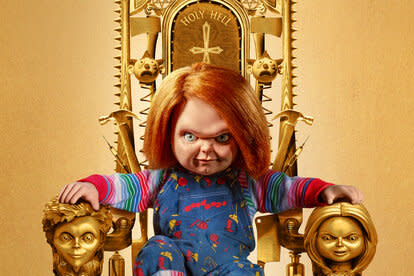'The Twilight Zone' producer on short-lived revival 20 years later: 'They did not know what they wanted'
During the production of UPN's short-lived 2002 revival of The Twilight Zone, Ira Behr found himself in a position similar to that of Rocky Valentine at the end of "A Nice Place to Visit." That is to say the writer and executive producer went from heavenly excitement to his own personal Hell.
Not too long before this, the enticing opportunity to revive The Twilight Zone — the iconic anthology series created by Rod Serling — came to Behr after the cancelation of ABC's Bob Patterson.
"We were doing sitcom hours, so I would get home at 6 o'clock in the morning and have to be back at the office at 11. It was tough, which turned out to be a good thing, because it prepared me for The Twilight Zone, which had many challenges of its own," he tells SYFY WIRE over Zoom, looking back at the short-lived revival 20 years after its debut. "When they offered it to me, I just thought, ‘It's The Twilight Zone!’ I like the Twilight Zone!' I'm always looking for something new to do, so an anthology sounded good. And it went downhill from there."
RELATED: Everything you need to know about SYFY's 2022 Twilight Zone New Year's Eve marathon
Originally slated to air on CBS, home of the original anthology and its 1985 revival, this 21st-century iteration was ultimately moved over to UPN (a forerunner to The CW) in an effort to appeal to a younger demographic of viewers.
"All they wanted us to do was cast rappers and other people whose acting experience was… let’s just say limited," Behr recalls. "Sometimes it worked, sometimes it did not work. And they got into this crazy-ass kick on making the show seem relevant. But since they [referring to the executives] were neither young nor relevant, it was like a talking a**hole."
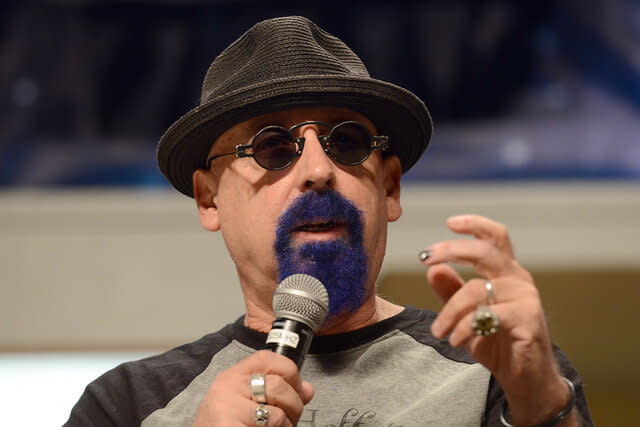
Producer Ira Steven Behr Photo: Albert L. Ortega/Getty Images
The producer and his team hoped to kick off the proceedings with a sci-fi/horror story about a genetically-engineered fetus that plots to kill its mother and father, but the network refused to green-light the concept. "The response was, ‘No! We’re not doing that episode. It makes us uneasy.’ It’s the f***ing Twilight Zone, it’s supposed to make you uneasy," Behr recalls. "And from there on, it became a bit of a hell to get stories past that were Twilight Zone-specific according to them."
Constant network interference compounded with grueling four-day production schedules between episodes didn't help alleviate the stress. "And since they were throwing out stories left and right, you're trying to find time to produce a show and produce scripts. Anthologies do not need all those chefs," he explains, later adding that one terrible script in particular reportedly came from a friend or family member from one of the higher-ups (Hollywood nepotism at its finest). "We read the script and it's like, ‘Are you f***ing kidding me? This is not good.’ So we wound up spending all night trying to fix [it] because we [knew we] would have to shoot it. That's how it went [over] 40 episodes."
Poorly channeling the character of Ernest Truex's Pedott in the 1959 episode "What You Need," the network also insisted that the 2002 revival needed to remake a number of famous installments from the show's original run like "Eye of the Beholder" (1959) and "The Monsters Are Due on Maple Street" (1960).
"After they stuck us in a hole so deep that we couldn't see daylight, they said, ‘Oh, now we're gonna help you! Do ‘Eye of the Beholder.’ [We said:] ‘We don't want to do ‘Eye of the Beholder.’ [And they said:] ‘Do The Monsters are Due on Maple Street!’ [We said:] ‘We don't want to do that.’ [And they said:] ‘No, you have to because this is what you need and we're making your lives easier,'" Behr continues.
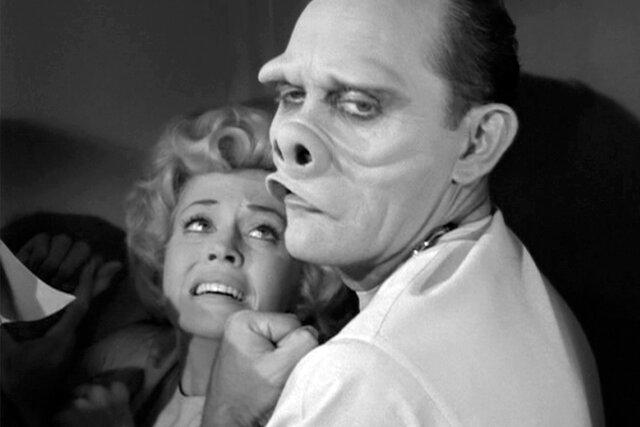
Twilight Zone episode 'Eye of the Beholder' Photo: CBS via Getty Images
Thankfully, there were a number of bright spots along the way, including "It's Still a Good Life," which aired in early 2003 and served as a sequel to the influential 1961 episode "It's a Good Life," which told the story of a young boy with uncontrollable, god-like powers.
Bill Mumy (a personal friend of Behr's) reprised the role of Anthony Fremont, with the actor's daughter, Liliana Mumy, playing his super-powered offspring. "I thought that the episode worked," Behr adds. "We had to do some cutting for production and for money, which was a little disappointing, so we kind of shrunk in scope from what we had originally thought of it. But I thought the show was a nice tip of the hat to the original episode."
The late Cloris Leachman, another cast member from the OG episode, returned to play Anthony's mother. "I had a fantastic time with Cloris. We went out to dinner with her [and] she flirted with me the entire time," the producer remembers fondly.
While out to dinner with the legendary actress, Behr lamented the fact that he'd accidentally left the "Do Not Disturb" sign on the door of his hotel room and wouldn't have clean towels or a made-up bed when he returned later that evening. "So about 12 o'clock at night, we get back to the hotel and I get in the door. I'm just about to get ready for bed and there's a knock on the door. I open up the door and there's Cloris Leachman with a stack of fresh towels that she went got for me, which I thought was sweet as hell."
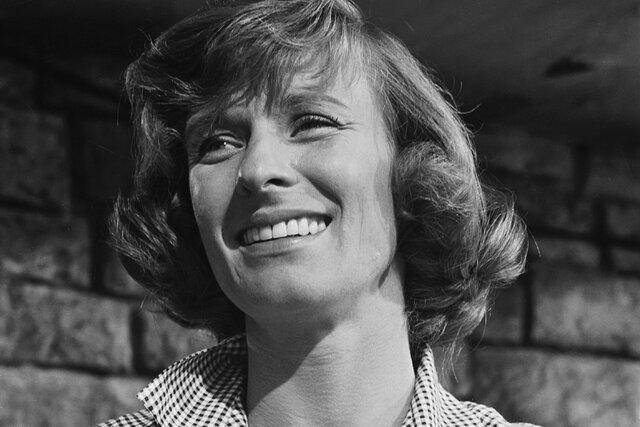
American actress Cloris Leachman Photo: CBS Photo Archive/Getty Images
Indeed, the caliber of talent involved with the 2002 Twilight Zone revival was bar none with appearances from Jason Bateman, Katherine Heigl, Amber Tamblyn, Jason Alexander, Jeremy Piven, Portia de Rossi, Ethan Embry, Christopher Titus, Hill Harper, Samantha Mathis, Jeffrey Combs, Gil Bellows, Lou Diamond Phillips, and others. "We lucked out with some of them and then sometimes we were given people who just could not deliver," Behr admits. Just a few years away from his Oscar win for Best Actor in The Last King of Scotland, Forest Whitaker stepped into the host/narrator role originally occupied by Serling himself.
"They did not know what they wanted. We were going through name after name after name," Behr says, revealing that Dennis Hopper and Henry Rollins were also potential candidates. "No one could agree on anything. It was like, ‘Okay, we're gonna have to have someone host it. Someone's gonna have to be there eventually.' And finally, the name that everyone could agree on was Forest Whitaker. At the time, he had talked about being involved a little more in the show than just being the host, but he only came in one day. He sat in the writers’ room for one day, which was kind of cool. But at that point, I felt the show had bigger problems than who was hosting it."
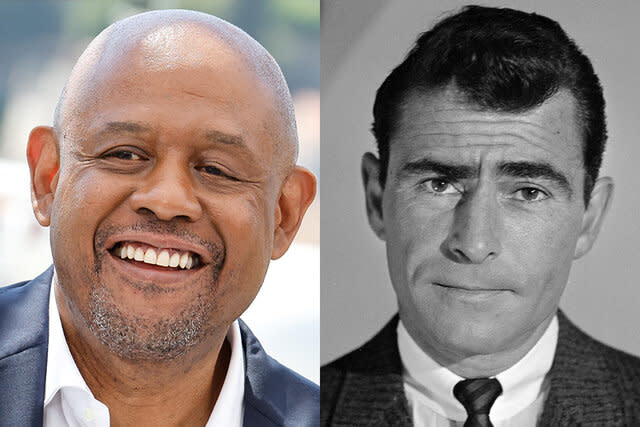
Forest Whitaker; Rod Serling Photo: Toni Anne Barson/FilmMagic; CBS Photo Archive/Getty Images)
Despite the thoroughly unpleasant work environment, all of the writers were gung-ho about returning for a second season. "I asked the staff, I said, ‘Look, if by some miracle we come back, is anyone willing to do this a second time?’ And every one of them said, ‘Yes.’ In spite of all the s*** that went down, it was like, ‘Nope, we survived it. The second season might get better. Maybe they'll leave us alone. It's still The Twilight Zone. It's still a chance to do something different each week. It's still a challenge.’"
Despite the willingness to keep the 'Zone open, UPN axed the anthology after a single season. "They put you in the God damn schoolyard, in the playpen, and then they don't let you play," notes a frustrated Behr, concluding that there was a silver lining to the experience. "I still see people who I worked with on the show and I still consider them friends."
To relive the acclaimed original series that started it all, SYFY's annual Twilight Zone marathon kicks off on New Year's Eve at 5 a.m. ET with the Larry Blyden and Sebastian Cabot-led classic, "A Night Place to Visit." But here's the patented twist: in addition to featuring episodes from the OG series, this year's marathon will also include a number of tales from the Jordan Peele-produced revival that ran for two seasons on Paramount+ between 2019 and 2020.
Looking for more anthologies with a genre bent? The Ray Bradbury Theater, Alfred Hitchcock Presents, and The Alfred Hitchcock Hour are now streaming on Peacock.
